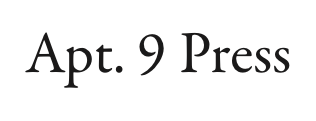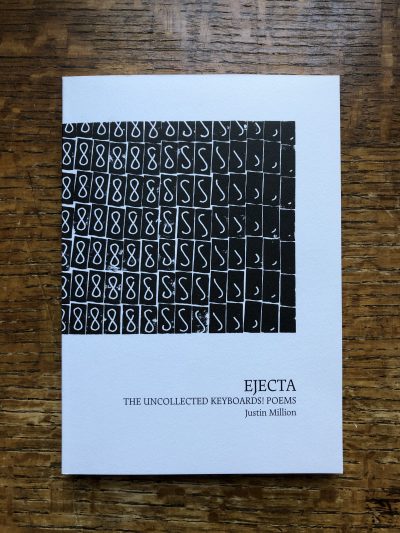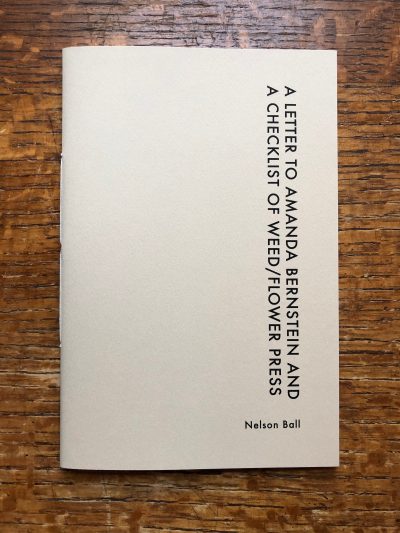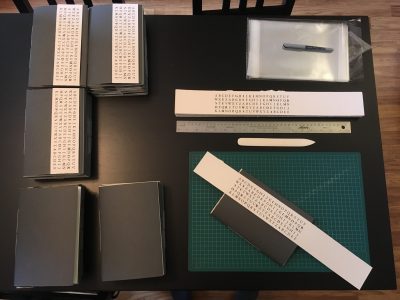
Founder
Cameron Anstee lives and writes in Ottawa ON where he runs Apt. 9 Press and holds a Ph.D. in Canadian Literature from the University of Ottawa. He is the author of one collection of poetry, Book of Annotations (Invisible Publishing, 2018), and editor of The Collected Poems of William Hawkins (Chaudiere Books, 2015).
Tell us a bit about your press. How did you start? Who are your influences, in Canada and beyond? What is your mission? What about small press publishing is particularly exciting to you right now?
Apt. 9 published its first titles in 2009 and has published more than 50 titles to date. I had spent the previous years working with a magazine and chapbook press out of Carleton University (In/Words), where I had learned the some of the basics of folding and stapling and trying to get books into people’s hands. As my time at Carleton was ending, I knew I wanted to continue making chapbooks, and so began to solicit books from Ottawa-based writers I admired. Some of the influences of Apt. 9’s initial work were Contact Press (Raymond Souster especially) and Coach House, with Nelson Ball’s body of work (Weed/Flower Press, Weed, Hyphid) taking on a greater influence over the years. More contemporary influences are found in the folks around the country finding ways to put out interesting and challenging books and chapbooks—The Emergency Response Unit and Ferno House were important points of reference when I was starting out, Baseline has become a standard of excellence, Puddles of Sky is a longtime favourite, Simulacrum and Gap Riot and The Blasted Tree and bird-buried inspire, the tirelessness of Proper Tales and above/ground and No Press continue to amaze… I’m late to the (non-Canadian) Timglaset party but they’re kicking my ass more and more all the time.
The mission, in broad terms, is to publish books that I am excited to publish. I regularly steal Stuart Ross’s assertion that he publishes books he wishes that he’d written. I am much less active as publisher than I was in previous years. This is, in part, because of a shift in the circumstances of my life (from research and teaching to a more traditional 9-5 job), but is also a conscious response to what I see happening around me in Ottawa (and beyond). There are so many great people doing great work in this city, and the generation(s) that has appeared in since I started is astounding. Mags and presses and reading series putting out exceptional work and led by folks that aren’t straight white men – Canthius and Coven and Riverbed Reading Series and Little Birds and Hussy and Battleaxe and changes at In/Words and and and… They are answering questions about art and writing and representation and reception and community that I didn’t even know how to ask in 2006 when I took my first tentative steps. I love it all, and I’m so happy to buy the books and magazines and read the work and attend readings when I can. I am conscious of trying to take up less space than I used to occupy, which is easy given that there is no shortage of exceptional work being done and that it feels as though the community is in better hands than ever.
How does your press work to engage with your immediate literary community, and community at large?
I approach the small press as a community project, with nodes throughout my immediate city, throughout the country, and of course between cities and countries. Small press writers are, more often than not, also small press editors, publishers, book designers, organizers of public events, critics, librarians and archivists, and primary readers. To engage in the small press is to take responsibility for some part of that community, and to be responsible to its past, present, and future. It can only survive when the responsibility is dispersed.
Small press tends to get discussed as a marginal practice—that is, something happening from the margins of the broader literary and publishing world—and Ottawa is at the margins of even that marginal community! Whatever I’m doing, it is from a small corner of a small corner of a small corner! And more than that, it is a brief moment in time in a long history of small press writing and publishing. I’m continually amazed by the breadth and depth of things happening in the poetry and small press community in Ottawa and Canada right now. I try to be mindful of what has come before, and I try to tend to my small corner of it as carefully as I can. I try to act within the small press as a reader, writer, publisher, editor, and researcher—some years I am more one, some years I more another. I try to act in all of these roles with kindness and curiosity.
How have the current multiple global crises impacted your work with the press?
There have been a handful of immediate impacts, beyond the general upheaval of all aspects of daily living. First, we did not get to host the events we were planning to celebrate the publication of Justin Million’s Ejecta. The book and the project are celebrations of being in physical spaces together, so while we did run one digital event so far, it felt a step removed from what it should have been (as have all things in life since March, really). The press also has two collaborative publishing projects on the go, and these have been somewhat interrupted by the current conditions. Beyond immediate publishing plans, it has prompted reflection on what the press does, why, and what it may look like (or should look like) in the future.

Ejecta: The Uncollected KEYBOARDS! Poems
Justin Million
March 2020
The most recent title from the press is Justin Million’s Ejecta: the Uncollected KEYBOARDS! Poems. KEYBORDS! was a monthly live-typewriting event that Justin ran in Peterborough. At each event, he would set up a typewriter in a bar, write poems, and recite the poems upon completion. The single copy of each poem would then be placed on a bar stool for anyone to take away. Over the course of two years, he wrote some 500 poems this way. Ejecta collects the poems that were not taken away—132 uncollected poems, reproduced in facsimile from the typewriter originals. It also includes an essay I wrote on the project, and a talk from Justin. I love this book, and am so sad that we can’t be out there celebrating it in person at the moment.

A Letter to Amanda Bernstein and a Checklist of Weed/Flower Press
Nelson Ball
June 2019
This was the final book Nelson published during his life. It is exactly what it sounds like—a letter to Amanda Bernstein, who is the Rare Books Librarian at the University of Sheffield, and a checklist of Weed/Flower. Nelson goes into more detail than ever before about his work as an editor and publisher and about each individual title and writer he published. I think it is a remarkable document, and a necessary book in small press libraries.
